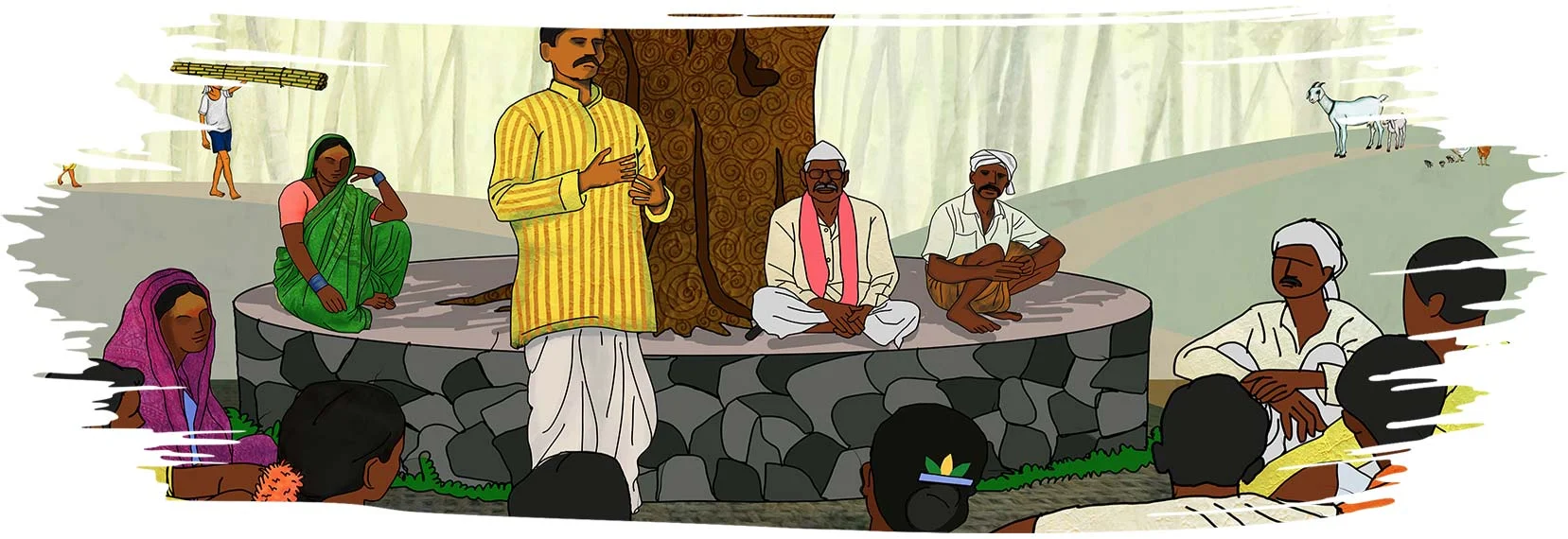Principles of Change Management
The following 8 principles of change management form the core of Barefoot Academy’s transformational praxis:
The First Principle

The first principle affirms the objective of the change management initiative to be citizen-focused governance. Therefore, the program attempts to trigger a perspective shift and an attitudinal change in every government functionary who participates in the program. In turn, this leads to shifting the primary objective of the government to the welfare and advancement of the citizen.
The Second Principle

The second principle that underlies the change program is that the perspective and attitudinal shift of the government functionary has to be accompanied by a change in the organisational culture. Hence, participation in the program is not enough. The participants have to bring their colleagues, subordinates and superiors into the ambit of change. Hence, while stimulating individual attitudinal change, the process also has to facilitate a shift in the organisational culture, which would nurture the pro-citizen attitudinal change of the government functionary and would in turn evolve into a pro-citizen organisation. Therefore, it is necessary that the leadership of the organisation, whether at the district, block or village level, are made integral parts of the program as part of a conscious design of inclusion and participation.
The Third Principle

The third principle that runs through the program of change management is that governance reform is a continuous process. It is a dynamic that integrates the intellect and the emotions of participants at all times. This process cannot be switched on and off according to one’s preferences. Hence, each workshop is a space from which change emerges in a participant’s personal life (family & friends) ‘workspace’ (colleagues, subordinates & superiors) and ‘work site’ (community), which are the respective arenas for action and experimentation, post-workshop.
The Fourth Principle

The fourth principle of change management (mostly a corollary of the previous one) is that change is a Continuous cycle of praxis across:
- Workshop (space for exploration),
- Work-place (site for experimentation) and
- Work-site (space for empowerment).
Hence the workshop as a site of ‘reflection’ has to necessarily be followed up with change projects at the participants’ respective arenas of action. The change projects at the work–site in turn trigger the process of reflection at the workspace and the workshop. This cycle of praxis plays a dual objective:
- It draws the participant into collaboration with citizens, reflecting itself in improvements in the delivery of any scheme or policy.
- It invites citizens into relations of cooperation and co-ownership with functionaries of state departments, leading to the improvement of schools, health centres, and other similar institutions.
The change projects at the work-place draw colleagues and subordinates into the governance reform process, assisting in the process of transforming institutional cultures whereby the whole organisation becomes pro-citizen and supports pro-citizen change initiatives.
The Fifth Principle

The fifth principle stresses the fact that governance reform is a comprehensive process that embraces the change maker, their colleagues and subordinates at the workplace, the citizen at the work-site and the organisation itself. The first workshop triggers a movement towards change on the part of the participant by encouraging them to initiate simple, appropriate and effective change projects for the work-place and the work-site. These projects then have a life of their own and set into motion both intended and unintended effects in the area of employee morale, ownership of the change agenda, collaboration and enthusiasm within the organisation. Gradually, a change in institutional culture manifests as a result of changes in both the participants as well as their respective change projects. Subsequent workshops become a space to celebrate milestones, learn creatively from each other, share insights, reflect on past endeavours, and set a course for future action with a rejuvenated sense of enthusiasm and solidarity among each other. Thus, the work-shop, work-place, work-site triad emerges as an inter-changing site for learning-doing-reflecting-sharing-learning-doing and becomes a self-perpetuating process.
The Sixth Principle

The sixth principle is that change management recognises that governance is a partnership which begins in the process of unmaking and remaking between the public servant and the public (citizen) and eventually leads to a shift in their relationship from benefactor-beneficiary to equal partners. Though difficult and fraught with the possibility of remission on the part of either party, establishing a sense of partnership in any change management exercise is imperative for governance reform to take place eventually. It is thus necessary to recognize that the citizen is a ‘rights holder’ and the public servant a ‘responsibility bearer’, a relation which flows from the Preamble to the Constitution. The rewards in this partnership are of a very different order, viz. a sense of ‘heightened satisfaction of having done one’s duty to the nation’. In this sense, the nature of the partnership between the public servant and the public is the essential difference our change management exercises have, in comparison to those of a corporate or any other agency. Therefore, the outcomes that follow from our change management for governance reform is radically different from that of a typical consultancy.
The Seventh Principle

The seventh principle revolves around the principles of adult learning and socio-emotional learning. While the principles of adult learning are based on auto-reflection and critical thinking, the principles of socio-emotional learning are broadly grounded on one’s human experiences and using that as an anchor for getting in touch with their authentic self and expanding their consciousness. Any human activity is sustained by emotional gratification, either in the present or in the proximate future. This sense of gratification in the change management process is associated with one’s self-identification with values dear to them. When consciously highlighted during workshops, this gratification manifests in the form of pride and ownership within participants and urges each of them to move faster, rise higher, and reach farther.
The Eighth Principle

The eighth principle is the paradigm of egalitarian learning, best reflected in the construct of the ‘Koodam’, which has been adapted from an age-old practice of community leadership observed not only in South India but all over South Asia. The earliest known adherent of this practice was Ashoka who viewed the ‘Sangha’ as a paradigm of democratic governance. The Koodam is a non-hierarchical, non-invasive, non-impositional forum for a free, open, critical and constructive exchange of views, opinions, agreements and disagreements. with an intent to reach a consensus in action. The Koodam also emerges as a space that stimulates thought, generates actionable insights, and offers avenues for collaborative ventures. It also contributes to building a sense of unity based on equality in diversity, and a shared commitment to free and frank exchange whilst respecting differing opinions and worldviews.



